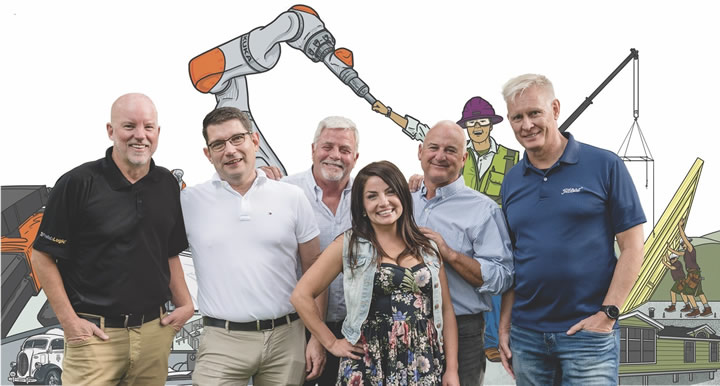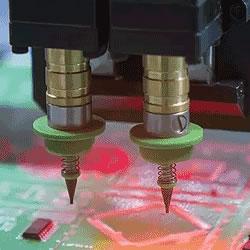MODULAR AND ROBOTICS PIONEERS UNVEIL SYSTEM P4--PREDESIGNED HOUSING FACTORY SOLUTION

Pioneers in modular construction and car factory automation have teamed up to advance the construction industry. U.S. modular housing pioneer, Waypaver International and German automation leader KUKA are today unveiling a predesigned automation solution to produce modular housing. The solution, System P4, provides everything a factory owner needs for an automated modular housing operation, off the shelf.
System P4 is designed by Waypaver, powered by KUKA automation technology, and backed by the P4 Housing Collective. The P4 Housing Collective includes four separate companies: Waypaver, Prefab Logic, Modular Maven, and Effektiv House. The team collectively offers a construction ecosystem of plant design, people development, preconstruction design/engineering, and products ready to be built—designed together to work together with System P4.
System P4 began with a collaboration between Rick Murdock, CEO and Founder of Waypaver, and Timo Heil, one of the CEO's of the KUKA System Group. Murdock and his business partner Curtis Fletcher pioneered the use of automation in construction in what is now the highest volume automated modular factory in the western U.S. Following this success, Murdock and Fletcher were sought out by developers, factory owners, and municipalities seeking new solutions to the global housing crisis.
"Developing the world's first automated plant of its kind forced us to make big advancements in construction engineering and manufacturing," Murdock said. "The goal has always been to learn and share better ways to build, advance modular construction, and make housing more attainable worldwide. Collaborating with KUKA on System P4 is a major next step because it gives future factory owners a turnkey solution based on real-world lessons learned by pioneers in both construction and automation."
Heil—who has extensive experience in the conceptual design, planning and implementation of complex systems—adds, "KUKA has played a decisive and global role in shaping the automation of the automotive industry in its more than 100-year history. Together with the strong team around the P4 system, we will put all our know-how into a paradigm shift in the way we build homes. Because nothing less than that is needed to meet the global challenge of housing shortages. Automation closes the wide gap between construction capacity and demand, while also making construction more efficient—both in terms of cost and sustainability."
KUKA, a leader in automation for car-manufacturing, had a vision for how their technology and automation expertise could be used to build housing. Murdock, Heil, and Fletcher teamed up to envision a factory design that could combine KUKA technology and innovation with the proven best practices of automated modular construction to give modular factory startups a predesigned solution. The result, System P4, is a complete solution including Waypaver plant floor layout and logistics combined with KUKA robotics automation, hardware, and integration services.
System P4 is a response to the worldwide housing crisis due in part to labor shortages and inefficiencies in construction. According to McKinsey & Co, construction is the world's largest industry, yet it has been one of last and slowest to advance technologically. Between 1900 and today, car manufacturing has made staggering advancements. In the 1920s, it took Ford 12 hours to produce a car; today a car is produced in less than a minute. With System P4, Murdock, Heil, and Fletcher see similar opportunities to reduce the time it takes to build housing—while relieving workers in the construction trades of physical stress.
"Our constant focus is making homes attainable, and making construction more precise, more productive, and easier," Fletcher said. "The P4 Housing Collective is a team of separate companies united around this shared passion. We've made huge progress with data-driven methods for smarter construction and standard products plus automation to take the back-breaking work off of people. System P4 is powered by KUKA, and backed by data-driven preconstruction, off-the-shelf products, and people development programs—all designed to work together with System P4. This is great news for developers, municipalities, and modular builders looking to establish their own steady stream of quality housing."
KUKA
KUKA is a global automation corporation with sales of around 3.3 billion euro and roughly 14,000 employees. The company is headquartered in Ausburg, Germany. As one of the world's leading suppliers of intelligent automation solutions, KUKA offers customers everything they need from a single source: from robots and cells to fully automated systems and their networking in markets such as automotive, electronics, metal and plastic, consumer goods, e-commerce/retail and healthcare.
System P4
System P4 is the first automation system predesigned as a turnkey automation solution for offsite construction. System P4 is designed to set much higher benchmarks for square feet of housing produced per person as well as number of housing modules completed per 40-hour workweek. The system takes proven approaches of construction automation to new levels: reducing steps, putting materials at point of use, advancing prefabrication, prioritizing machine functions for safety, reduced physical stress, and digitizing shop drawings and office communications. System P4 is backed by the P4 Housing Collective and powered by KUKA.
Waypaver International
Waypaver International is a small and mighty team of modular manufacturing experts with proven expertise helping design numerous modular plants. The team's members average more than 30 years in modular construction each. Waypaver's founder led the development of the first automated modular plant of its kind, and acted as the factory's most senior manager as it became the highest-volume modular factory in the western U.S. in less than three years. Collectively, the team has led the design of more than a dozen modular plants. Waypaver is committed to helping potential plant owners and operators understand risks, avoid costly mistakes, and enjoy the adventure of paving the way for a smarter, faster, more efficient construction industry worldwide. https://www.waypaverintl.com
The P4 Housing Collective
P4 Housing Collective is a team of independent companies working to supercharge the construction process through an ecosystem of standard products and services designed together to work together. P4 is an abbreviation of the four elements, including:
Plants: automation, robotics, software, integration, facility design and operational consulting led by Waypaver International https://www.waypaverintl.com
People: Factory startup culture programs, modern office design, and industry innovation consulting led by Modular Maven https://www.modularmaven.com
Precon (preconstruction): data-driven preconstruction, digital twin technology, experienced project design and logistics team led by Prefab Logic https://www.prefablogic.com
Products: off-the-shelf plans pre-vetted for automation, constructability, and optimized materials supply chain led by Effektiv House https://www.effektivhouse.com
Featured Product

